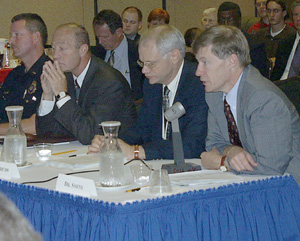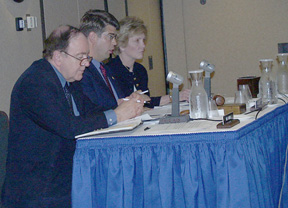 Two UNMC officials testified last week during a congressional field hearing on bioterrorism at UNMC.
Two UNMC officials testified last week during a congressional field hearing on bioterrorism at UNMC.
U.S. Rep. Lee Terry, R-Neb., hosted the July 3 hearing of the Subcommittee on Government Efficiency, Financial Management and Intergovernmental Relations. The two-hour hearing examined the effectiveness of the federal government in assisting state and local governments in preparing for a possible biological, chemical or nuclear attack.
“We must be prepared for the unexpected,” Rep. Stephen Horn, R-Calif., subcommittee chairman, said in his opening remarks. “We must have the mechanisms in place to protect this nation and its people from further attempts to cause massive destruction.”
In a KKAR interview prior to the hearing, Terry praised UNMC’s expertise. “One of the things I’m proud to showoff is the University of Nebraska Medical Center and their level of preparedness. They will have the game plan, the facilities and the mechanisms set in place to treat (patients) if there’s any type of a biological attack.”
At the hearing, Philip Smith, M.D., chief of UNMC’s infectious diseases section, said a survey of Nebraska hospitals and nursing homes in the spring of 2001 found that fewer than 2 percent were prepared for a bioterrorist attack. Today, the facilities are better prepared, he said, noting that 50 to 75 percent of the health facilities would be ready for an attack.
 In cooperation with the state Department of Health and Human Services, NHS University Hospital is planning a bioterrorism isolation unit, Dr. Smith said. Such a unit would serve as a statewide resource and could deal safely with a variety of contagious bioterrorist conditions.
In cooperation with the state Department of Health and Human Services, NHS University Hospital is planning a bioterrorism isolation unit, Dr. Smith said. Such a unit would serve as a statewide resource and could deal safely with a variety of contagious bioterrorist conditions.
“As we learned in the 2001 anthrax attacks, small numbers of cases of an infectious disease create enormous concerns for public safety while the cases are being diagnosed and treated,” Dr. Smith said. “Potentially hazardous infectious disease cases are most likely to be sent to the university hospitals where the most concentrated expertise is available.”
Steven Hinrichs, M.D., director of the Nebraska Public Health Laboratory, said help was needed in developing electronic information systems that connect government agencies with hospitals and laboratories, including those in the private sector. “Many of the current systems are primitive and consist of e-mail or facsimile (fax) notification systems rather than direct connections that allow real-time monitoring and exchange of information.”
Universities represent a national resource, Dr. Hinrichs said, and should be included in efforts to:
- educate the public regarding threats from biological, nuclear and chemical agents;
- train first responders and volunteer service providers; and
- research new approaches to identifying and responding to acts of bioterrorism.
UNMC also has proposed developing a collaborative group bioterrorism medical training program, Dr. Smith testified. The program would include representatives from such agencies as the state department of health, the state hospital association, the state nursing home association, the state infection control network, the two medical schools in Nebraska, the two Metropolitan Medical Emergency Response Systems in Nebraska, the infection control nurse organization and state telecommunications experts.
Photos in descending order:
1) Philip Smith, M.D., right, chief of infectious diseases at UNMC, testifies at the field hearing while Steven Hinrichs, M.D., seated next to Dr. Smith, listens. Dr. Hinrichs is an associate professor at UNMC and is director of the Nebraska Public Health Laboratory. Seated next to Dr. Hinrichs is Paul Wagner, chief of the Omaha Fire Department.
2) From left, U.S. Rep. Stephen Horn, R-Calif., U.S. Rep. Lee Terry, R-Neb., and Bonnie Heald, staff director for the Subcommittee on Government Efficiency, Financial Management and Intergovernmental Relations, listen to testimony during the field hearing.